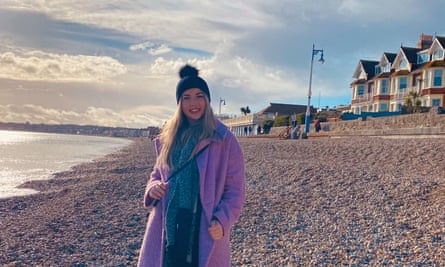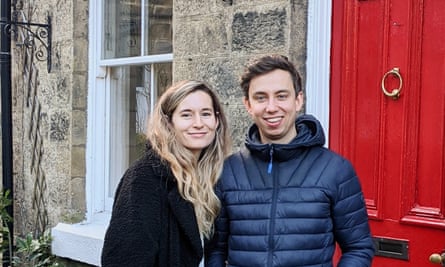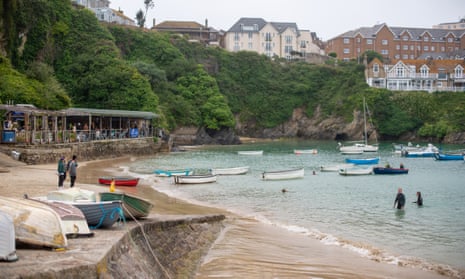Gaby Morse, 28, and her partner, Doug Marshall, 30, had been living the dream in London: relishing the creative chaos and thriving on the social life of the capital – and barely noticing that they could only afford to live in separate, tiny flats.
But during the first lockdown, the couple, co-founders of Altaura, an international sound design agency, decided to move from London to Cornwall.
They are just two of the large numbers of young people who have moved out of big cities who say it’s the best decision they ever made – and expect others of their generation to follow them in abandoning metropolitan life.
“Three months locked down in London made us focus on what really matters, and it turns out not to be the hectic nightlife,” said Morse. “What matters is being able to open our front door and be on an empty clifftop or beach within minutes.”
On the advice of a friend who had already left London, they exchanged their cramped flats for a spacious apartment in Newquay overlooking Fistral Bay. The couple are in no doubt that moving out of the city is the best decision they have ever made.
“It’s amazing here,” said Marshall. “We’re happier, calmer and, amazingly, don’t suffer from Fomo [fear of missing out] – which is a complete revelation.”
The couple are now looking to buy a house in Cornwall. They say they are certain they won’t be out-off-city pioneers for long.
“Our age group has a lot more faith in the countryside since the pandemic hit,” said Marshall. “I think there will be a massive boom of 20- to 40-year-olds moving in the next few years. Thanks to remote working, cities aren’t where it has to be at any more.”
PricewaterhouseCoopers’ 2021 UK Economic Outlook recently reported that “Covid-19 has fundamentally changed the way we view cities” and predicted that London’s population would decline for the first time in the 21st century as people move out.
New research for the Guardian by Hamptons estate agents shows this is already happening, with first-time buyers accounting for over a third of households buying outside the capital, up from 29% in 2019.
Dom Jackman, co-founder of Escape the City, a careers platform for professionals, said: “Since the pandemic, we’ve seen our job seekers’ preferences for remote work going through the roof.”
Chloe Price, a 23-year-old children’s nurse who moved from Walthamstow to Dorset in June, said the pandemic killed her love of city life.

“During the first lockdown, my boyfriend and I lived in a dingy flat,” she said. “We would enviously watch friends and family living near the seaside on social media as they would go on coastal hikes or swim in the sea.
“This lockdown is a breeze compared to city lockdown,” she said. “One day we will return to London but it will be as tourists.”
Graphic designer Natalie Scott, 30, moved with her husband from south London to Headingley in Leeds in December. “During lockdown, we were paying £1,700 rent for a tiny flat that we would never be able to afford to buy, even if we wanted to. We’ve bought a small cottage and love our life here,” she said, adding: “I know several people making moves like this.”

Tom Booth, a 27-year-old musician, moved from Glasgow to Moffat in September and advises everyone who can get out of the city to do it.
“We’ve been living in Moffat now almost six months and I’ve found that I don’t think about the thriving city any more. Instead, I think about the beauty of the simple, natural things in life,” he said. “I thank my lucky stars every day that I got out of the city.”

But some who have moved warn that the transition can be hard. Edward, 28, a music journalist, desperately missed his old life after moving from Glasgow to Whitland, a small market town in south-west Wales, in mid-October last year.
“I started to miss everything; my girlfriend, my friends, going to art galleries and gigs, sitting in Queen’s Park on a sunny afternoon,” he said. “I felt I was moving backwards.”
Edward is now planning to move to Belfast with his girlfriend. “It took time but eventually I [discovered a peace in Whitland],” he said. “I feel incredibly fortunate to have been able to call it my home, even if I would never dream of living here.”
Anthony Breach, an analyst at Centre for Cities, said reports of the city’s demise were greatly exaggerated.
“Now routine information can be easily exchanged over Zoom, information that requires face-to-face contact becomes more valuable,” he said. “This means big cities offering a mix of talent and ideas will bounce back from this pandemic, as they have from previous ones.”
